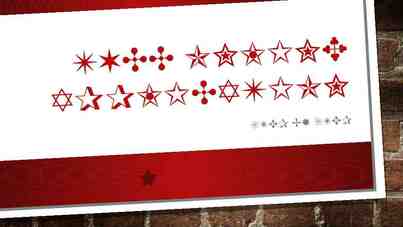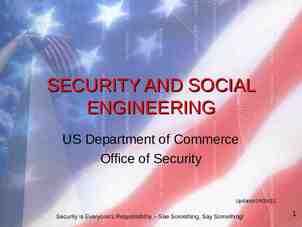Dazzle Them at Business Lunches, Dinners, and Anyplace Else Where
23 Slides780.00 KB

Dazzle Them at Business Lunches, Dinners, and Anyplace Else Where a Fork is Required

Adopt the 80/20 Rule Think that a knife and fork as just sweet, innocent, dining tools? Think again! Rather than worrying about every little detail, focus on the key few the will give you the biggest bang for your buck. Take a cue from John the Intern.

Manners are Important Table manners play an important part in making a favorable impression. The point of etiquette rules is to make you feel comfortable, not uncomfortable. At a private dinner party, like you will be at tonight, the meal begins when the host or hostess unfolds his or her napkin. The host or hostess will signal the end of the meal by placing his or her napkin on the table.

Good Etiquette Rules Arrive at least 10 minutes early unless otherwise specified. Pass the food from left to right. Always say please when asking for something. Food is served from the left. Dishes are removed from the right. Keep elbows off the table. Do not talk with your mouth full. Chew with your mouth closed.

The Place Setting

Your Fork is Not A Shovel When you eat, your fork is held in your right hand like a pencil. When you cut your food, switch hands. Fork goes in left hand, Knife goes in right hand to cut. With your index finger, point your fork with the tines facing down to pierce your food. Don’t cut up all of your food at once. Switch the fork back into the right hand to eat.

Etiquette Pre-Quiz Let’s see how much we know. Take a few minutes and complete this pre- quiz. This quiz has the basics that will help you in a social setting and once we discuss it, will help you not sweat the small stuff.

Place your napkin on your lap when food arrives. False. Put your napkin in your lap the minute everyone has sat down. Generally the napkin is placed on your lap and folded in half. The napkin stays in your lap throughout the meal. If you need to leave the table, place your napkin in your chair while you are gone. At the end of the meal, leave the napkin semifolded at the left side of the place setting. It should not be crumpled or twisted.

It is proper dining etiquette to butter the whole piece of bread False. You should break apart the bread and butter the small pieces as you eat them. You should always eat in small bites and slowly. Butter, spreads, or dips should be transferred from the serving dish to your plate for spreading or eating.

You can start eating once everyone has been served. True. Wait for your host or hostess to begin eating first – when he or she picks up their fork to eat, than you may eat. Do not start before this unless the host or hostess insists that you start eating.

Always Scoop Your Soup Away from You True This allows it to cool and also can avoid spills on your business suit. Don’t blow on food to cool it off. If it is too hot to eat, take the hint and wait.

When someone asks for the salt, you also pass the pepper True. You should always pass both the salt and the pepper at the same time. Even if someone asks for only one, you should pass both of them. This is so dinner guests do not have to search for orphaned shakers. Set any passed item directing on the table instead of passing hand to hand. Never intercept a pass. Snagging a roll out of a breadbasket or taking a shake of salt when it is en route is a no-no.

It is acceptable to answer your cell phone during a meal. False. Turn it off. Cell phones have no place in a business lunch, dinner, or other business social setting. That goes for Blackberrys or other PDAs as well. If your phone does ring, simply turn it off and apologize. If you absolutely have to take a call, explain this to the people at the table before the event begins. If and when the phone rings, leave the table and take the call outside (briefly).

In a professional setting, nourishment is not the main purpose. True – networking is your main purpose. You may never know what to wear, so look sharp. Dress in your formal PBL uniform. Master the art of conversation. Don’t forget to introduce yourself. Don’t interrupt. Don’t dominate the conversation. Do listen.

Never Season Without Reason True Do not add condiments, spices, and sauces to your meal until after you taste. Do try a little bit of everything on your plate.

It is okay to greet from your seat when new guests join your table. False. Everyone should stand until the new guests are seated. Gentlemen should pull out the chair for the ladies. When a lady leaves the table, all gentlemen at that table should stand.

Always select your silverware starting from the outside in. True. Your salad fork and meal fork will be on the left. You knives and spoons in the right. Dessert forks/spoons are generally found at the top of the plate or they come with the dessert.

When you are finished, push your plate forward a few inches. False. To signal that you are done with the course, rest your fork, tines up, and knife blade in, with the handles resting at five o’clock and the tips pointing to ten o’clock on your plate. Any unused silverware is simply left on the table.

You should not put a used utensil back on the table True. It should always be kept on the edge of your plate. If you drop your utensil on the floor, simply and politely ask the server to bring you a replacement. Don’t clean up spills with your own napkin, and don’t touch items that have dropped on the floor. You can use your napkin to protect yourself from spills.

Your drinking glass is on the right if you are right handed and on the left if you are left handed. False. Think BMW – as you look down on your place setting and scan your eyes left to right, think BREAD, MIDDLE, WATER. The bread plate will always be to your left and your water glass to your right.

It is proper to chew gum/mints after a meal. False. Gum chewing can be considered rude – especially if you are have a conversation while chewing gum.

When dining with professionals, if you have a craving for pizza, ribs, it is okay to order it. False – Keep your order simple – anything that requires the use of fingers is out. Take cues from your host/hostess on how much or what to order. Even if you are paying, don’t order the most expensive thing on the menu – middle of the road is fine. If you have food allergies, be gracious. Discreetly let your server know that you can’t eat something. Remember, you are not there for the food, you are there for networking.

In Summary . . . Whether you are attending your first business social event or your 2oth, you are not there for the food. You are there to build relationships. Keep the focus off your table manners so that others can focus on you instead.






